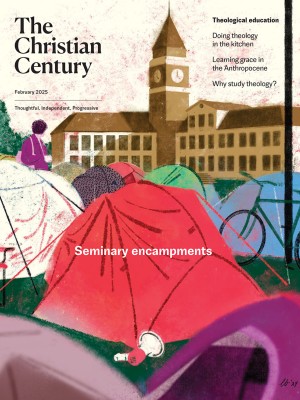What does it mean to be a Christian in these times?
We have a cross at the center of our faith, and we need to start acting like it.

Century illustration
I cannot count the times that I have been asked what it means for us to be Christian in times like these. Ours is a time when far too many of God’s children are subjected to conditions that foster death, not life. It’s a time when racism, xenophobia, White Christian nationalism, and other forms of bigotry are increasing across the globe. Hate crimes are on the rise in the United States as racial, ethnic, cultural, and political polarization festers; while African Americans remain the most frequent victims, crimes against transgender people and Jewish people have increased dramatically since 2022. And in the richest country in the world, 11 percent of the population is trapped in poverty, with its comorbidities of inadequate housing, health care, employment, food, education, and even recreational opportunities. It is clear that we are living in a kairos time.
A kairos time is a right or opportune time. It is a decisive moment in history with the potential for far-reaching impact. It is often a chaotic time, a time of crisis. Yet it is a time in which God is fully present, providing an opening, a way to God’s future. In their 1985 Kairos Document, South African clergy and theologians called it a “moment of grace and opportunity, the favourable time in which God issues a challenge to decisive action.” But it is also “a dangerous time, because if this opportunity is missed, and allowed to pass by, the loss for the Church [and the wider society] will be immeasurable.”
Read our latest issue or browse back issues.
“What does it mean to be Christian in this time?” is thus an urgent question. Yet the answer is simple: we have a cross at the center of our faith, and we need to start acting like it.
The cross demands that we join in God’s eternal mission to create a loving and just world. “God is always seeking to create a world and a society where all are loved, where justice is done, and where the God-given equality of us all is honored in our relationships, in our social arrangements, and in law,” says Michael Curry, former presiding bishop of the Episcopal Church. This divine mission must become our human mission. We are, therefore, called by the cross into a human/divine partnership to cultivate a world and society where the sacredness of all God’s creation is respected and where all people—without exception—can live freely and fully into the abundance of life that God promises.
As pioneering liberation theologian Gustavo Gutiérrez aptly put it, the cross necessitates “forward-directed action” that “penetrate[s] the present reality . . . driving history toward a more just future.” Essentially, to be a Christian in this our time means to act decisively to repair the breach between our unjust present and God’s just future by creating spaces of freedom, equity, and empathy for those who have been denied them.
God is not neutral when it comes to injustice. God enters history on the side of the marginalized and oppressed, in their struggle to live free of unjust social, cultural, and political realities. It is when those who are on the underside of justice begin to experience justice that we know we are at least on the arc that bends toward the justice of God. Thus, while we are not called to engage in partisan politics, to do the work of the cross is to be partisan when it comes to the values of God. These are values that promote justice and thereby preserve, cherish, respect, and enhance the sacred dignity and worth of every single human being. They are values that free people to live into the fullness of their sacred humanity, as opposed to values that betray the sacred humanity of us all. Moreover, if the cross means anything to us, these values cannot simply be rhetorical—they must come alive in the decisions and choices we make in our social/political living.
There is no getting around it: the mission of God that is defined by the cross means that we must be politically engaged. The cross dictates that we make real, in the messiness of our everyday living, the values that reflect the justice God wants for God’s people. And we have a model for that: a crucified savior.
When Jesus, reading from Isaiah, said he came “to bring good news to the poor . . . to proclaim release to the captives and recovery of sight to the blind, to let the oppressed go free,” he meant it (Luke 4:18–19). And while he did not endorse any particular political party of his day, he was political as he embodied perfectly the values and mission of God. In so doing, he not only affirmed and restored life to those who suffered most from the perils of injustice but also stood firmly against the principalities and powers that were an affront to the very justice of God. Jesus “was never party political,” says former archbishop of Canterbury Justin Welby. “No wing of politics—left or right—can claim God as being on its side. But Jesus was highly political. He told the rich that, unlike the poor who were blessed, they would face woes. He criticised the King as a fox. He spoke harsh words to leaders of the nations when they were uncaring of the needy. He did this because God cares for those in need and expects those who claim to act in his name to do the same.”
It is clear that Jesus was not crucified for neutrality and silence regarding the injustice of his day. He was crucified because he spoke against that which was an affront to the values of God, even as he manifested that which reflected God’s just future. As the mission of God defined Jesus’ life, so it should be for those of us with a cross at the center of our faith.
To be a Christian in times like these means what it should mean at any time. For there is no time that is not a kairos time, no time when God is not fully present and providing a way to God’s future. Thus there is no time when we are not called, like Jesus, to bear the cross, to be committed to making real the justice of God that is freedom from all that prevents us from being a society where the humanity of each and every human being is honored and respected. In this and in all times, to be a Christian is to act like a people with a cross at the center of our faith.







